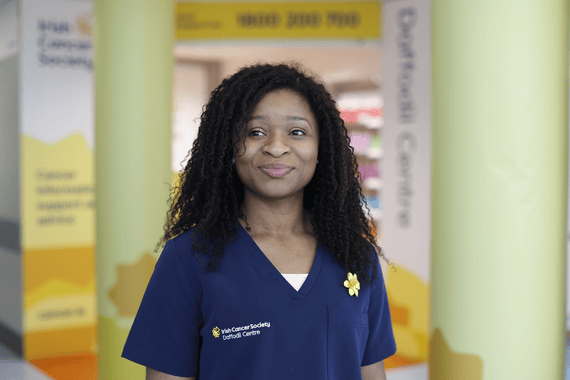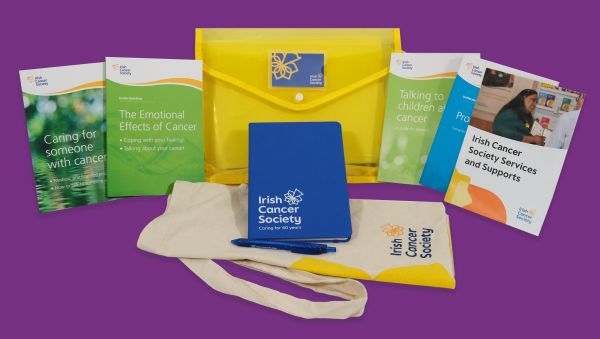Brain tumours
Diagnosis and tests
Diagnosing brain tumours
Your family doctor (GP) will talk to you about your symptoms and may do some simple tests, such as:
- Physical exam
- Mental assessment (for example, asking you questions)
- Neurological (brain function) test. This can include things like checking the strength in your arms and legs, checking your balance and coordination, testing your swallowing or gag reflex, testing your facial muscles and checking your eyes and hearing.
Your GP will refer you to hospital if they think you need more tests. Tests you might have include:
This is a scan that uses magnetic energy to build up a picture of the tissues inside your body. During the scan you will lie inside a tunnel-like machine.
Read more about MRI scans.
A special type of X-ray to give a picture of the tissues inside your body.
Read more about CT scans.
Using a radioactive injection that will show up any cancer spread to other parts of your body on a scan picture.
Read more about PET scans.
A test to record electrical activity in your brain using plastic discs (electrodes) put around your head. The brain activity is then recorded and shown on a printout.
A test to look at blood vessels in your head by injecting a special dye into your body, through your groin. It is done if your doctors are concerned that your tumour is close to a blood vessel.
Taking a small tissue sample of the tumour to find out more about it. For example, what type of tumour you have. A brain biopsy is a type of brain surgery.

If you are diagnosed with a brain tumour, we're here for you.
Our cancer nurses are here if you need information or just want to talk. They can help you to understand your diagnosis and what to expect, send you information and tell you about our services.
How are brain biopsies done?
You will probably have a biopsy during an operation to remove all or part of your tumour. Brain surgery is a big operation, so it’s better to do everything at the same time if you’re having surgery. You may have a biopsy and then go on to have other treatments such as radiotherapy and chemotherapy.
The biopsy is done under general anaesthetic. During the operation the surgeon uses a fine needle to remove a sample of the tumour through a hole drilled in your skull.
This is where computers and scans guide the biopsy. You may also have a head frame fitted to help the surgeon to pinpoint exactly the right place.
You usually need to stay in hospital for a few days when you have your biopsy. Some hospitals may do the surgery as a day case, which means you do not need to stay in hospital overnight.
After the operation, a doctor called a pathologist examines the sample in the laboratory. The tests performed on the tumour in the laboratory may take 1-2 weeks to complete.
The pathologist will write a report on the biopsy sample. The pathology report will give your doctors more information about your tumour and its grade and help them to decide if you need further treatment.
If a sample of tumour is sent for genetic profiling, it will take longer for your test results to come back. These samples will be sent to a special laboratory to get information on your DNA. This is called genetic or DNA profiling. It can give your doctor more detailed information about your tumour to help plan the best course of treatment for you. Your sample may need to be sent abroad for genetic profiling.
Waiting for test results
While some results may come back quickly, others may take a few weeks. Waiting for results can be an anxious time. It may help to talk things over with your doctor or nurse or with a relative or close friend. You can also call our Support Line on 1800 200 700 or visit a Daffodil Centre to speak to a cancer nurse.
Further tests for brain tumours
You may need further tests to give your doctors more information about your general health and about the tumour. For example:
Your doctor checks your vision, hearing, alertness, muscle strength, coordination, and reflexes. Your doctor also examines your eyes to look for swelling caused by a tumour pressing on the nerve that connects the eye and the brain.
These scans build up a picture of the tissues inside your head. You might have an injection before the scan to show up certain areas of your brain. They might be used to show where your tumour is before surgery / biopsy.
A biopsy means removing a small piece of the tumour so that it can be examined under a microscope. A biopsy is the only sure way to find out what type of brain tumour you have and how fast it is growing (the grade).
- Neurologists specialise in diagnosing, treating and managing disorders of the brain and nervous system.
- Neurosurgeons specialise in operating on the brain and nervous system.
What are the grades of brain tumours?
The tests you have can help to grade your cancer. Grading describes how quickly the cancer may grow and spread and how it might respond to treatment.
Your brain tumour will be given a grade depending on how the tumour cells look under a microscope. The grade is a number from 1 to 4. The number tells how quickly the tumour might grow. A higher number means a faster-growing tumour.
Sometimes a low-grade tumour can become a higher-grade tumour. How a tumour behaves will also depend on the type of tumour you have.
Grade 1 tumours are usually called low-grade or benign (not cancer). Usually they grow slowly and do not spread to other parts of the brain.
Grade 2 tumours also grow relatively slowly (low grade), but in time they may spread to other parts of the brain or become malignant (cancerous).
Grade 3 or 4 tumours are called high-grade or malignant. They grow more quickly and are more likely to spread into normal brain tissue. It is common for higher-grade tumours to return some time after treatment. This is known as recurrence.
Tumours that arise from the layers covering the brain are also graded. These tumours are normally graded from 1 to 3. Most of these tumours are grade 1 and they are usually cured by surgery.
Knowing the grade of your cancer helps your team to plan the best treatment for you. Grading can be hard to understand, so ask your doctor and nurse for more information if you need it.
Continue reading about brain tumours




Get help & support

Support Line
Free support pack

